By Robert Wyllie · Tuesday, October 22, 2013 As an occasional feature on TELOSscope, we highlight a past Telos article whose critical insights continue to illuminate our thinking and challenge our assumptions. Today, Robert Wyllie looks at Alain Manville’s “Hegel and Metaphysics,” from Telos 42 (Winter 1979).
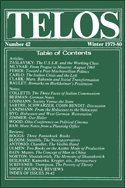 In “Hegel and Metaphysics,” Alain Manville joins the echelon of French theorists who attempt to focalize Hegelianism around one core concept. In the vanguard, Jean Wahl turned unhappy consciousness into an organizing principle for reading Hegel. More famously, Alexandre Kojève pared Hegelianism down to the core master-slave dialectic. Manville focuses upon the annihilation of metaphysics in Hegel’s speculative recognition that being equals nothingness. Speculative thought transcends the understanding (Vernunft), which sees only an ontological contradiction. Hegel dismisses Vernunft and metaphysics, Manville argues, to grasp concrete reality in a postmetaphysical sense. In “Hegel and Metaphysics,” Alain Manville joins the echelon of French theorists who attempt to focalize Hegelianism around one core concept. In the vanguard, Jean Wahl turned unhappy consciousness into an organizing principle for reading Hegel. More famously, Alexandre Kojève pared Hegelianism down to the core master-slave dialectic. Manville focuses upon the annihilation of metaphysics in Hegel’s speculative recognition that being equals nothingness. Speculative thought transcends the understanding (Vernunft), which sees only an ontological contradiction. Hegel dismisses Vernunft and metaphysics, Manville argues, to grasp concrete reality in a postmetaphysical sense.
Continue reading →
By Telos Press · Monday, October 21, 2013 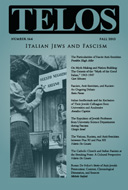 On Saturday, October 26, the Telos-Paul Piccone Institute and the Centro Primo Levi will host a panel discussion on Telos 164: Italian Jews and Fascism. The discussion will be held at Casa Italiana Zerilli Marimò, 24 West 12th Street, in New York City, from 1 pm to 4pm. Following the discussion, there will be a cocktail reception that will include Maria Piccone’s delicious “amaretti” cookies, in honor of Telos‘s 45th Anniversary. We hope to see you there! On Saturday, October 26, the Telos-Paul Piccone Institute and the Centro Primo Levi will host a panel discussion on Telos 164: Italian Jews and Fascism. The discussion will be held at Casa Italiana Zerilli Marimò, 24 West 12th Street, in New York City, from 1 pm to 4pm. Following the discussion, there will be a cocktail reception that will include Maria Piccone’s delicious “amaretti” cookies, in honor of Telos‘s 45th Anniversary. We hope to see you there!
Continue reading →
By Maja Sidzinska · Thursday, October 17, 2013 As an occasional feature on TELOSscope, we highlight a past Telos article whose critical insights continue to illuminate our thinking and challenge our assumptions. Today, Maja Sidzinska looks at James Kalb’s “Understanding Conservatism and Tradition,” from Telos 124 (Summer 2002).
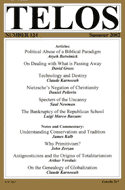 Let’s start with the punch-line: James Kalb informs us, in his article “Understanding Conservatism and Tradition,” that “the modern emphasis is too much on technology, on breaking things down to their simplest parts and reconstructing them in accord with human will. The problem with applying that approach to human life as a whole is that one can make sense of one’s actions only by reference to standards and realities one does not create” (164). In Kalb’s view, tradition creates these standards and realities, and is irreplaceable in this role. He compares the role of tradition to the roles of bureaucracy and markets, and he holds these three operative approaches as constitutive of politics, public policy, and life more generally. Let’s start with the punch-line: James Kalb informs us, in his article “Understanding Conservatism and Tradition,” that “the modern emphasis is too much on technology, on breaking things down to their simplest parts and reconstructing them in accord with human will. The problem with applying that approach to human life as a whole is that one can make sense of one’s actions only by reference to standards and realities one does not create” (164). In Kalb’s view, tradition creates these standards and realities, and is irreplaceable in this role. He compares the role of tradition to the roles of bureaucracy and markets, and he holds these three operative approaches as constitutive of politics, public policy, and life more generally.
Continue reading →
By Telos Press · Monday, October 14, 2013  On Saturday, October 26, the Telos-Paul Piccone Institute and the Centro Primo Levi will host a panel discussion on Telos 164: Italian Jews and Fascism. The discussion will be held at Casa Italiana Zerilli Marimò, 24 West 12th Street, in New York City, from 1 pm to 4pm. We hope to see you there On Saturday, October 26, the Telos-Paul Piccone Institute and the Centro Primo Levi will host a panel discussion on Telos 164: Italian Jews and Fascism. The discussion will be held at Casa Italiana Zerilli Marimò, 24 West 12th Street, in New York City, from 1 pm to 4pm. We hope to see you there
Continue reading →
By Johanna K. Schenner · Tuesday, October 8, 2013 As an occasional feature on TELOSscope, we highlight a past Telos article whose critical insights continue to illuminate our thinking and challenge our assumptions. Today, Johanna Schenner looks at Alain de Benoist’s “The End of the Left-Right Dichotomy: The French Case,” from Telos 102 (Winter 1995).
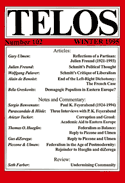 In his article “The End of the Left-Right Dichotomy: The French Case,” Alain de Benoist points to the gradual disappearance of traditional political ideologies in both socialist and conservative parties. In fact, Sofres Polls support this statement: in March 1981, 33% of the population viewed this delineation as outdated; in February 1986, 45% of the population shared this view; in March 1988, this proportion reached a new record level of 48%; and eventually in November 1989, more than half of the French population deemed this ideological antagonism as obsolete (73). In his article “The End of the Left-Right Dichotomy: The French Case,” Alain de Benoist points to the gradual disappearance of traditional political ideologies in both socialist and conservative parties. In fact, Sofres Polls support this statement: in March 1981, 33% of the population viewed this delineation as outdated; in February 1986, 45% of the population shared this view; in March 1988, this proportion reached a new record level of 48%; and eventually in November 1989, more than half of the French population deemed this ideological antagonism as obsolete (73).
Continue reading →
By Linas Jokubaitis · Thursday, September 26, 2013 As an occasional feature on TELOSscope, we highlight a past Telos article whose critical insights continue to illuminate our thinking and challenge our assumptions. Today, Linas Jokubaitis looks at Paul Piccone’s “Lukács’s History and Class Consciousness Half a Century Later,” from Telos 4 (Fall 1969).
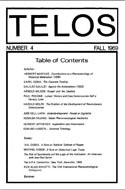 In 1969, when Paul Piccone wrote “Lukács’s History and Class Consciousness Half a Century Later,” almost fifty years had passed since the publication of Georg Lukács’s magnum opus. Piccone wrote this essay to mark that anniversary, and he argued that this work was an “underground classic.” Moreover, he asserted that this book was essential for any analysis of modern thought. According to Piccone, everyone attempting to understand and overcome the ideological crisis of Marxism would be wise to consult this book. In 1969, when Paul Piccone wrote “Lukács’s History and Class Consciousness Half a Century Later,” almost fifty years had passed since the publication of Georg Lukács’s magnum opus. Piccone wrote this essay to mark that anniversary, and he argued that this work was an “underground classic.” Moreover, he asserted that this book was essential for any analysis of modern thought. According to Piccone, everyone attempting to understand and overcome the ideological crisis of Marxism would be wise to consult this book.
Continue reading →
|
|
 In “Hegel and Metaphysics,” Alain Manville joins the echelon of French theorists who attempt to focalize Hegelianism around one core concept. In the vanguard, Jean Wahl turned unhappy consciousness into an organizing principle for reading Hegel. More famously, Alexandre Kojève pared Hegelianism down to the core master-slave dialectic. Manville focuses upon the annihilation of metaphysics in Hegel’s speculative recognition that being equals nothingness. Speculative thought transcends the understanding (Vernunft), which sees only an ontological contradiction. Hegel dismisses Vernunft and metaphysics, Manville argues, to grasp concrete reality in a postmetaphysical sense.
In “Hegel and Metaphysics,” Alain Manville joins the echelon of French theorists who attempt to focalize Hegelianism around one core concept. In the vanguard, Jean Wahl turned unhappy consciousness into an organizing principle for reading Hegel. More famously, Alexandre Kojève pared Hegelianism down to the core master-slave dialectic. Manville focuses upon the annihilation of metaphysics in Hegel’s speculative recognition that being equals nothingness. Speculative thought transcends the understanding (Vernunft), which sees only an ontological contradiction. Hegel dismisses Vernunft and metaphysics, Manville argues, to grasp concrete reality in a postmetaphysical sense.  On Saturday, October 26, the Telos-Paul Piccone Institute and the
On Saturday, October 26, the Telos-Paul Piccone Institute and the  Let’s start with the punch-line: James Kalb informs us, in his article “Understanding Conservatism and Tradition,” that “the modern emphasis is too much on technology, on breaking things down to their simplest parts and reconstructing them in accord with human will. The problem with applying that approach to human life as a whole is that one can make sense of one’s actions only by reference to standards and realities one does not create” (164). In Kalb’s view, tradition creates these standards and realities, and is irreplaceable in this role. He compares the role of tradition to the roles of bureaucracy and markets, and he holds these three operative approaches as constitutive of politics, public policy, and life more generally.
Let’s start with the punch-line: James Kalb informs us, in his article “Understanding Conservatism and Tradition,” that “the modern emphasis is too much on technology, on breaking things down to their simplest parts and reconstructing them in accord with human will. The problem with applying that approach to human life as a whole is that one can make sense of one’s actions only by reference to standards and realities one does not create” (164). In Kalb’s view, tradition creates these standards and realities, and is irreplaceable in this role. He compares the role of tradition to the roles of bureaucracy and markets, and he holds these three operative approaches as constitutive of politics, public policy, and life more generally.  In his article
In his article  In 1969, when Paul Piccone wrote “Lukács’s History and Class Consciousness Half a Century Later,” almost fifty years had passed since the publication of Georg Lukács’s magnum opus. Piccone wrote this essay to mark that anniversary, and he argued that this work was an “underground classic.” Moreover, he asserted that this book was essential for any analysis of modern thought. According to Piccone, everyone attempting to understand and overcome the ideological crisis of Marxism would be wise to consult this book.
In 1969, when Paul Piccone wrote “Lukács’s History and Class Consciousness Half a Century Later,” almost fifty years had passed since the publication of Georg Lukács’s magnum opus. Piccone wrote this essay to mark that anniversary, and he argued that this work was an “underground classic.” Moreover, he asserted that this book was essential for any analysis of modern thought. According to Piccone, everyone attempting to understand and overcome the ideological crisis of Marxism would be wise to consult this book. 

